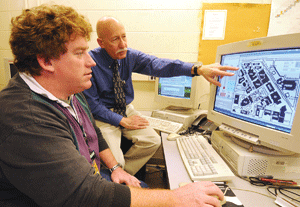Is the next must-have cell-phone feature a radiation detector?
Working with the Indiana Department of Transportation, Ephraim Fischbach, a physics professor at Purdue University (West LaFayette, IN) and Jere Jenkins, director of the university’s School of Nuclear Engineering radiation laboratories, are developing a system that would use a network of cell phones equipped with radiation sensors to detect and track nuclear emissions. Andrew Longman, a consulting instrumentation scientist, developed the system software and worked with the university researchers to integrate it with radiation detectors and cell phones. AT&T provided cellular air time.

Purdue’s Jenkins (left) and Fischbach review radiation-tracking data from an on-campus trial of their cell-phone-based system. (Purdue News Service photo/David Umberger)
With millions of cell phones whose global positioning locators would be able to pinpoint even light residues of radioactive material, the system could be used to help prevent terrorist attacks with radiological “dirty bombs” and nuclear weapons. The commercially available solid-state radiation sensors and additional circuitry required would not add significant bulk to cell phones, according to Fischbach, and the software can work with a variety of sensor types.
On-campus testing of the system last November demonstrated it could detect a weak radiation source 15 ft from the sensors, so before the sensors detected significant radiation, the system would have sent data to a receiving center. The collective action of the sensors, combined with the software analysis, detects the source.
For information on technology licensing, contact Karen White at 765-494-2609 or e-mail kfwhite@prf.org.
Richard Comerford
Advertisement
Learn more about Purdue University





